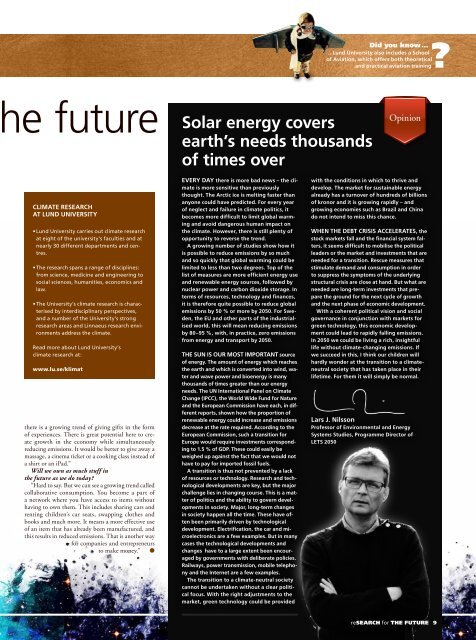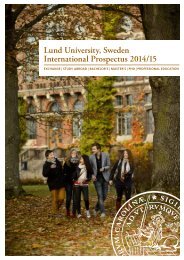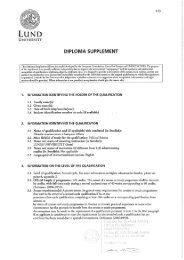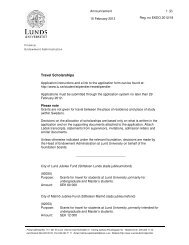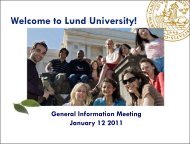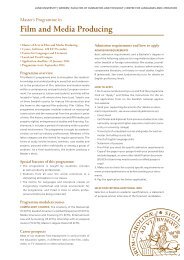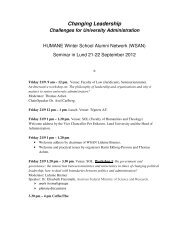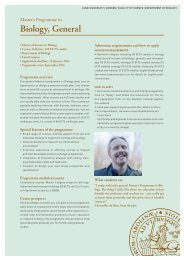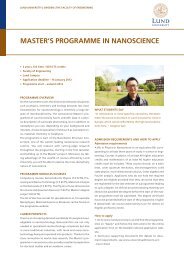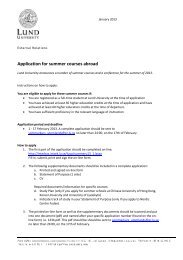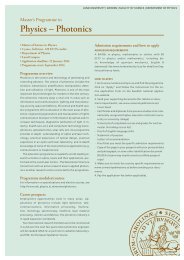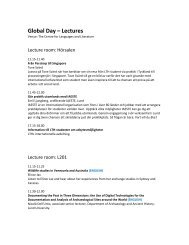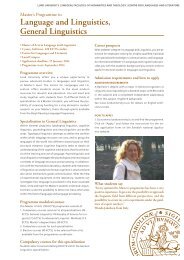"ReSearch for the Future" magazine (Pdf, 10 Mb) - Lund University
"ReSearch for the Future" magazine (Pdf, 10 Mb) - Lund University
"ReSearch for the Future" magazine (Pdf, 10 Mb) - Lund University
- No tags were found...
You also want an ePaper? Increase the reach of your titles
YUMPU automatically turns print PDFs into web optimized ePapers that Google loves.
Did you know ...?...<strong>Lund</strong> <strong>University</strong> also includes a Schoolof Aviation, which offers both <strong>the</strong>oreticaland practical aviation traininge futureSolar energy coversearth’s needs thousandsof times overOpinionClimate researchat <strong>Lund</strong> <strong>University</strong>• <strong>Lund</strong> <strong>University</strong> carries out climate researchat eight of <strong>the</strong> university’s faculties and atnearly 30 different departments and centres.• The research spans a range of disciplines:from science, medicine and engineering tosocial sciences, humanities, economics andlaw.• The <strong>University</strong>’s climate research is characterisedby interdisciplinary perspectives,and a number of <strong>the</strong> <strong>University</strong>’s strongresearch areas and Linnaeus research environmentsaddress <strong>the</strong> climate.Read more about <strong>Lund</strong> <strong>University</strong>’sclimate research at:www.lu.se/klimat<strong>the</strong>re is a growing trend of giving gifts in <strong>the</strong> <strong>for</strong>mof experiences. There is great potential here to creategrowth in <strong>the</strong> economy while simultaneouslyreducing emissions. It would be better to give away amassage, a cinema ticket or a cooking class instead ofa shirt or an iPad.”Will we own as much stuff in<strong>the</strong> future as we do today?“Hard to say. But we can see a growing trend calledcollaborative consumption. You become a part ofa network where you have access to items withouthaving to own <strong>the</strong>m. This includes sharing cars andrenting children’s car seats, swapping clo<strong>the</strong>s andbooks and much more. It means a more effective useof an item that has already been manufactured, andthis results in reduced emissions. That is ano<strong>the</strong>r way<strong>for</strong> companies and entrepreneursto make money.” ●Every day <strong>the</strong>re is more bad news – <strong>the</strong> climateis more sensitive than previouslythought. The Arctic ice is melting faster thananyone could have predicted. For every yearof neglect and failure in climate politics, itbecomes more difficult to limit global warmingand avoid dangerous human impact on<strong>the</strong> climate. However, <strong>the</strong>re is still plenty ofopportunity to reverse <strong>the</strong> trend.A growing number of studies show how itis possible to reduce emissions by so muchand so quickly that global warming could belimited to less than two degrees. Top of <strong>the</strong>list of measures are more efficient energy useand renewable energy sources, followed bynuclear power and carbon dioxide storage. Interms of resources, technology and finances,it is <strong>the</strong>re<strong>for</strong>e quite possible to reduce globalemissions by 50 % or more by 2050. For Sweden,<strong>the</strong> EU and o<strong>the</strong>r parts of <strong>the</strong> industrialisedworld, this will mean reducing emissionsby 80–95 %, with, in practice, zero emissionsfrom energy and transport by 2050.The sun is our most important sourceof energy. The amount of energy which reaches<strong>the</strong> earth and which is converted into wind, waterand wave power and bioenergy is manythousands of times greater than our energyneeds. The UN International Panel on ClimateChange (IPCC), <strong>the</strong> World Wide Fund <strong>for</strong> Natureand <strong>the</strong> European Commission have each, in differentreports, shown how <strong>the</strong> proportion ofrenewable energy could increase and emissionsdecrease at <strong>the</strong> rate required. According to <strong>the</strong>European Commission, such a transition <strong>for</strong>Europe would require investments correspondingto 1.5 % of GDP. These could easily beweighed up against <strong>the</strong> fact that we would nothave to pay <strong>for</strong> imported fossil fuels.A transition is thus not prevented by a lackof resources or technology. Research and technologicaldevelopments are key, but <strong>the</strong> majorchallenge lies in changing course. This is a matterof politics and <strong>the</strong> ability to govern developmentsin society. Major, long-term changesin society happen all <strong>the</strong> time. These have oftenbeen primarily driven by technologicaldevelopment. Electrification, <strong>the</strong> car and microelectronicsare a few examples. But in manycases <strong>the</strong> technological developments andchanges have to a large extent been encouragedby governments with deliberate policies.Railways, power transmission, mobile telephonyand <strong>the</strong> Internet are a few examples.The transition to a climate-neutral societycannot be undertaken without a clear politicalfocus. With <strong>the</strong> right adjustments to <strong>the</strong>market, green technology could be providedwith <strong>the</strong> conditions in which to thrive anddevelop. The market <strong>for</strong> sustainable energyalready has a turnover of hundreds of billionsof kronor and it is growing rapidly – andgrowing economies such as Brazil and Chinado not intend to miss this chance.When <strong>the</strong> debt crisis accelerates, <strong>the</strong>stock markets fall and <strong>the</strong> financial system falters,it seems difficult to mobilise <strong>the</strong> politicalleaders or <strong>the</strong> market and investments that areneeded <strong>for</strong> a transition. Rescue measures thatstimulate demand and consumption in orderto suppress <strong>the</strong> symptoms of <strong>the</strong> underlyingstructural crisis are close at hand. But what areneeded are long-term investments that prepare<strong>the</strong> ground <strong>for</strong> <strong>the</strong> next cycle of growthand <strong>the</strong> next phase of economic development.With a coherent political vision and socialgovernance in conjunction with markets <strong>for</strong>green technology, this economic developmentcould lead to rapidly falling emissions.In 2050 we could be living a rich, insightfullife without climate-changing emissions. Ifwe succeed in this, I think our children willhardly wonder at <strong>the</strong> transition to a climateneutralsociety that has taken place in <strong>the</strong>irlifetime. For <strong>the</strong>m it will simply be normal.Lars J. NilssonProfessor of Environmental and EnergySystems Studies, Programme Director ofLETS 2050reSEARCH <strong>for</strong> THE FUTURE 9


